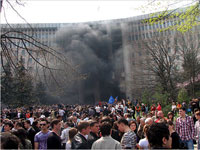Moldovans used Twitter to arrange protests
More than 10,000 young Moldovans came out to the streets on Tuesday to protest against Moldova’s Communist leadership. There began clashes with the police. People managed to gather a huge crowd in a short period of time using social messaging networks like Facebook and Twitter.

The protesters created their own searchable tag on Twitter, rallying Moldovans to join and propelling events in this small former Soviet state onto a Twitter list of newly popular topics, so people around the world could keep track.
After hundreds of firsthand accounts flooded onto the Internet via Twitter, Internet service in Chisinau, the capital, was abruptly cut off, nytimes.com reports.
Police were unable to keep protesters from ransacking the building in the capital, Chisinau, that houses the legislature and storming the offices of President Vladimir Voronin. It was unclear whether Voronin was in the building at the time.
Fueling the violence were allegations made by opposition leaders that Voronin's Communist Party-led government had falsified legislative elections Sunday in a bid to hold on to power.
Legislative elections in Moldova are pivotal because the president is selected by lawmakers. Voronin, who became president in 2001, has served two terms and is legally barred from a third. But the results of Sunday's elections preserved his party as the dominant political force.
Election observers from the Organization for Security and Cooperation in Europe said in preliminary findings that the vote was largely free and democratic, though it was marred by allegations of police intimidation of voters and candidates, latimes.com reports.
Opposition party leaders denounced the balloting as fraudulent, saying there was evidence of multiple voting. Demonstrators demanded a recount.
The worst violence to hit Moldova's capital in decades could complicate efforts to resolve the 18-year-old separatist rebellion in the Russian-speaking region of Transdniestria, where Russia has had troops since Soviet times.
Moldova, wedged between Ukraine and Romania on the edge of the European Union, is in what Russia sees as its sphere of influence. Moldova, which was once part of Romania, recalled its ambassador from Bucharest for consultations on the troubles.
Most of the protesters on the streets of Chisinau were students who say they see no future if Communists keep their hold on the ex-Soviet state of four million people, Reuters reports.
Late in the evening, about 600 people were still massed outside parliament. Some had waved European, Romanian and Moldovan flags from the roof of the president's offices.
Subscribe to Pravda.Ru Telegram channel, Facebook, RSS!





